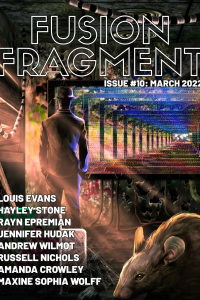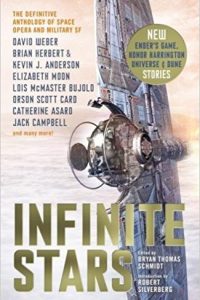Paul Di Filippo Reviews Saturation Point by Adrian Tchaikovsky
 Saturation Point, Adrian Tchaikovsky (Solaris 978-1837861743, hardcover, 176pp, $29.99) July 2024
Saturation Point, Adrian Tchaikovsky (Solaris 978-1837861743, hardcover, 176pp, $29.99) July 2024
Adrian Tchaikovsky is surely one of the hardest-working writers in fantastika. In 2023, besides a handful of short fiction, he delivered And Put Away Childish Things (which I reviewed here); Lords of Uncreation; and House of Open Wounds. This year has already seen Alien Clay and Service Model. And today we have to hand his latest, Saturation Point. Such productivity would be ignorable or even deridable, were the quality of his books mediocre. But all of his output that I’ve enjoyed has been top-notch. And so we less-superhuman writers are reduced to shaking our heads in awe and envy. Oh, well, c’est la vie!
Saturation Point tackles nothing less than the survival of human life on an Anthropocene-damaged Earth. But it does so in the form of a thriller—or even Lovecraftian horror—novel, highly cinematic, which might engender glancing comparisons to the Aliens series and the Avatar duology.
The tale is cast as a first-person narrative, but one that is also a document, a somewhat broken and fragmentary transcript of audio recordings made by Dr. Jasmine Marks. These snippets start out in the ostensibly sane world we know—a near-future Earth suffering typical climactic degradation—and end up in a nightmarish venue known as the Hygrometric Dehabitation Region, or, simply, the “Zone.” This slowly expanding territory is marked by hothouse atmospheric conditions inimical to human life, although plants and some fauna thrive. But humans must wear environmental suits.
Twenty years ago, Marks did her post-doc work in the Zone, along with her mentor Dr. Elaine Fell, who mysteriously vanished into the Zone. Now Marks will be enlisted for her old expertise by a return mission which pretends to be an innocuous survey team—run by a scary guy named Maxwell Glasshower—but which is really a search-and-destroy operation. What’s the target? Brace for a small spoiler which comes fairly early in the book and should not ruin your enjoyment: it appears that Dr. Fell, perhaps with unknown others, has engineered a new species of humanity that can flourish in the cruel conditions of the Zone. They could be deemed harmless when confined in their little terrarium. But when the Zone encompasses the whole planet—?
Marks soon becomes acquainted with her new posse under Glasshower. Some military folks, some scientists; some nice, some not so nice. The early part of the novel conjures up the details of the Zone with vividness and with scientific precision. Like Harry Harrison’s Deathworld, mortality lurks everywhere. But then the bioengineered natives start to emerge, and they prove far deadlier than the landscape. And what of Dr. Fell? Hang tight!
Tchaikovsky’s novel is bipartite, two halves that slot together like hand and glove. In his creation and depiction and traversal of the deadly Zone itself, he is playing in the territory of Strugatsky and Ballard, affirmations which the cast itself knowingly makes. (Why no allusions to VanderMeer’s Southern Reach trilogy is the interesting question.). We might also consider Budrys’s Rogue Moon and Silverberg’s The Man in the Maze as relevant. This is the cinematic rollercoaster part of the book, one nerve-shattering biome danger after another, and well done it is.
But when it comes to examining the implications of the new offshoot of humanity, Tchaikovsky switches gears, and we are inhabiting the creepy, more intellectual territory of Herbert’s Hellstrom’s Hive: humanity remade along the lines of Blish’s famous “pantropy” tales. Also little bits of Faber’s Under the Skin cling to the project.
When you combine these parallel elements, you get a tale where terrestrial strangeness merges with a more philosophical, Darwinian strangeness.
Since Marks is on every page, her character will sink or levitate the tale, and I’m happy to report that Tchaikovsky renders her quite believable and sympathetic. She’s not entirely sure, right up to the end, whether she is on Glasshower’s side, or still owes her loyalty to Dr. Fell. The other characters have sufficient plausible thickness for their more-limited roles. But other than Marks, only Glasshower enjoys any real substantiality. Although made out to be the villain, his finally revealed motives and reasoning will have you wondering if perhaps he was not acting nobly after all.
Ultimately, Tchaikovsky’s artistry takes on and endorses an almost cosmic point of view. Humanity becomes merely another dodo bird species, fated to be supplanted by the dwellers in the Zone. But the cold logic of the universe says that this outcome has to be accepted. Survival is the only metric of success.
Seeing all these different things that blew into the Zone like drifters in a Western and found they could work with what’s here. Food webs and synergies and a constantly changing cast of characters, but the ecology itself survives. Like a creature made up of other creatures, the ultimate hive organism. It goes on without us.
 While you are here, please take a moment to support Locus with a one-time or recurring donation. We rely on reader donations to keep the magazine and site going, and would like to keep the site paywall free, but WE NEED YOUR FINANCIAL SUPPORT to continue quality coverage of the science fiction and fantasy field.
While you are here, please take a moment to support Locus with a one-time or recurring donation. We rely on reader donations to keep the magazine and site going, and would like to keep the site paywall free, but WE NEED YOUR FINANCIAL SUPPORT to continue quality coverage of the science fiction and fantasy field.
©Locus Magazine. Copyrighted material may not be republished without permission of LSFF.






